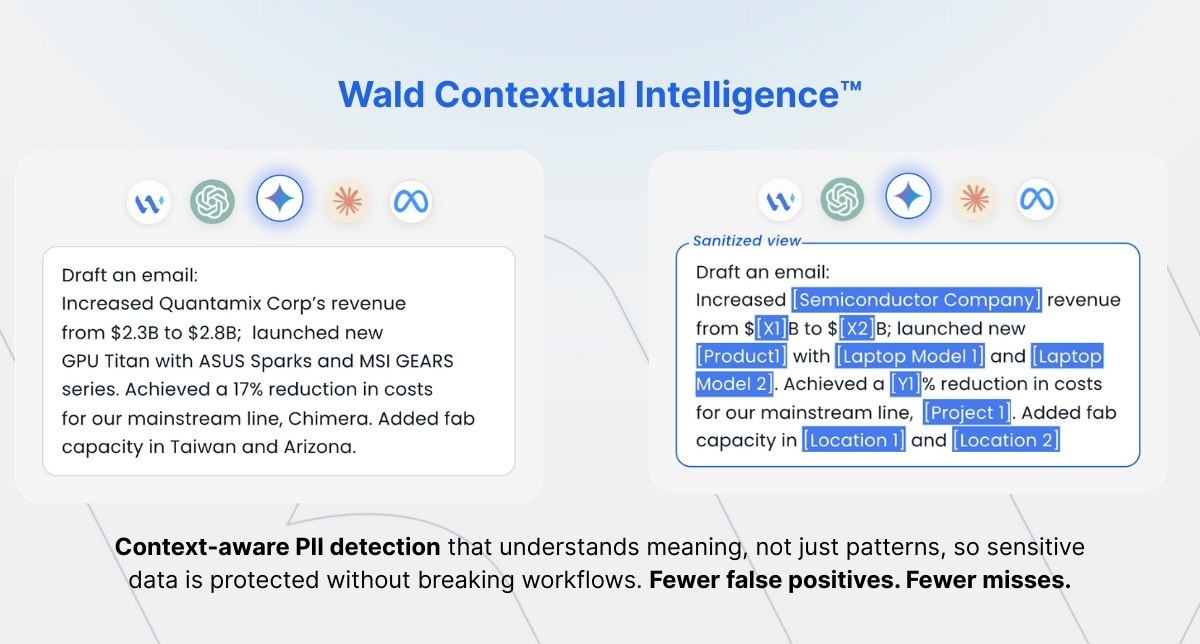Our data-centric world demands protection of sensitive information and Personally Identifiable Information (PII). Companies across sectors seek robust solutions to safeguard their data while adhering to privacy regulations. This blog post examines four leading PII redaction tools: Private AI, Wald, Redactable, and AssemblyAI. We’ll explore their features, user-friendliness, performance, and unique selling points to help you select the right tool for your data protection needs.
Wald offers a state-of-the-art Developer API that goes beyond PII removal. It aims to safeguard content based on context to ensure AI can use it.

Wald is designed with developers in mind making it simple to add to existing applications and AI setups. While some technical expertise might be needed, it provides many options to work with.
Wald’s Context Intelligence stands out because it can understand conversation context. This ability results in fewer false positives and negatives compared to traditional regex-based solutions.
A financial services chatbot using Wald’s API can have meaningful chats with customers while protecting sensitive financial data. This keeps the chatbot in line with industry rules.
Private AI offers a top-tier solution that leverages AI to identify, eliminate, and replace PII across multiple languages and file formats.
Private AI offers a straightforward interface and integrates smoothly with your existing workflows. Tech teams can deploy it with minimal hassle as it’s compatible with Docker and Kubernetes.
Private AI’s website claims they provide “the most accurate way to spot and remove PII on the market today.” This high precision helps stop data leaks and gives full protection of sensitive info.
A worldwide firm can use Private AI to deal with papers in lots of languages. This makes sure PII stays safe in all its global offices while sticking to rules.
Redactable is a cloud tool that has an influence on providing easy, AI-driven redaction for PDF files.
Redactable takes pride in its user-friendly interface, which makes it easy to use even for team members who aren’t tech wizards. Because it’s cloud-based, people can access and work together on it without a hitch.
Redactable claims it can save 98% of the time compared to redacting documents by hand, which boosts output while keeping high accuracy.
A law firm handling sensitive client files can turn to Redactable to mask private data in legal PDFs before sharing them with opposing counsel or submitting them to the court.
AssemblyAI shines in its power to change speech to text, but it also boasts strong features to strip PII from audio transcripts.
AssemblyAI offers clear guides and code samples, which helps developers set it up without much fuss. The choice to set PII rules gives you more say over what gets cut out.
AssemblyAI doesn’t provide specific accuracy figures. But because it uses cutting-edge AI models, it has a high success rate in identifying and eliminating PII from audio transcripts.
A call center can use AssemblyAI to transcribe and strip sensitive information from customer service calls. This helps them comply with data protection regulations while maintaining useful records for quality control.
When choosing a PII redaction tool, consider your specific needs:
All four tools offer robust PII protection, but they excel in different areas. Private AI and Wald provide more comprehensive solutions for various data types and AI integration. Redactable and AssemblyAI however, stand out in their specific fields of PDF and audio redaction.
In the end, the best tool for your company hinges on the type of data you handle, your technical expertise, and the regulations you must follow. When you consider these factors and examine each tool’s capabilities, you can ensure your sensitive information remains secure in today’s complex digital landscape.